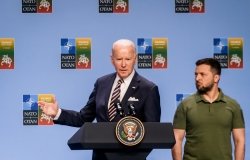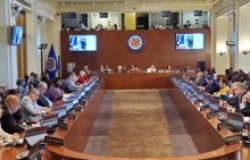5 Reasons to Think a U.S.-Iran Deal May Be Near
Unless you are on the inside and in touch with the rhythm of the talks, it’s tough to assess matters accurately, but here are five reasons to think a deal may be closer than ever according to Aaron David Miller.
Iranian Foreign Minister Javad Zarif said Wednesday that U.S. and Iranian negotiators were very close to a deal.
Trying to predict whether the talks will succeed by the March 24 deadline is like reading tea leaves or goat entrails: Unless you are on the inside and in touch with the rhythm of the talks, it’s tough to assess matters accurately. If reports are true that Iran’s supreme leader, Ayatollah Ali Khamenei, has been hospitalized with a serious illness, that might slow decision-making on the Iranian side.
Still, having been part of many negotiations over the years, I’d offer five clues that suggest the chances for a deal look better than ever:
1. Netanyahu’s visit. The Israeli prime minister broke a lot of crockery accepting House Speaker John Boehner’s invitation to address Congress. And while coming to Washington to defend Israel’s interests against the mullahs may be good politics, Benjamin Netanyahu came because he believes that a bad deal is not only being negotiated but that its conclusion is imminent. Israelis clearly have their own intelligence on the ebb and flow of negotiations.
2. More sanctions in the offing. Pressure is building in Congress to impose additional sanctions and to meddle in the negotiations. Mr. Netanyahu’s speech may well have raised concerns among Republicans and some Democrats about adding elements that might improve an agreement. Without some tangible evidence that the administration is succeeding, lawmakers will seek to meddle, add conditions, and create a congressional review mechanism for any agreement. Senate Majority Leader Mitch McConnell introduced the Iran Agreement Review Act on Wednesday, seeking to compel the Obama administration to submit any agreement and allow 60 days for review. If there is no agreement by month’s end, the administration will be living on borrowed time.
3. Kerry’s trip to Saudi Arabia. Israel isn’t the only U.S. ally worried about Iran. Secretary of State John Kerry flew to Riyadh to brief the Saudi king and other Gulf foreign ministers who gathered there as well. The crisis in Yemen was no doubt on the agenda. But as Mr. Kerry came directly from the negotiations with Iran, the nuclear agreement was most likely the central issue. The Saudis worry even more than the Israelis do that Washington is pursuing an Iran-centric strategy that will lead to greater cooperation on other regional issues and boost Iran’s influence in Iraq, Yemen and Syria.
4. Ernest Moniz joins the negotiations. The U.S. energy secretary has participated in the past two rounds of talks. An MIT nuclear physicist by training. Mr. Moniz has expertise on the nuclear issue and also reportedly had met Ali Akbar Salehi, the head of Iran’s Atomic Energy Agency–who is also part of the negotiations–in Boston during the 1970s. Mr. Moniz’s presence suggests that the talks are more serious, detailed and perhaps nearing the end phase.
5. Leaders who can make decisions. This isn’t the Arab-Israeli negotiations, in which there has been more process than peace. The U.S. and Iranian nuclear talks are driven by leaders who may be able and willing to make decisions, and gaps on core issues can actually be closed.
President Barack Obama wants an agreement that will preempt an Israeli military strike and make U.S. military action unnecessary. He believes that a slower, smaller Iranian nuclear program and one that is easier to monitor is better than no deal and believes that an agreement along the lines that Mr. Netanyahu supports is actually unrealistic. Iran’s supreme leader, on the other hand, knows that his country needs sanctions relief and believes that he’ll be able to preserve a good deal of Iran’s nuclear infrastructure if Tehran wants to weaponize some time in the future. He also knows that if the agreement lasts a decade or more, he is unlikely to be around next time.
The opinions expressed here are solely those of the author.
This article was originally published in The Wall Street Journal's Wasington Wire.
About the Author


Middle East Program
The Wilson Center’s Middle East Program serves as a crucial resource for the policymaking community and beyond, providing analyses and research that helps inform US foreign policymaking, stimulates public debate, and expands knowledge about issues in the wider Middle East and North Africa (MENA) region. Read more










